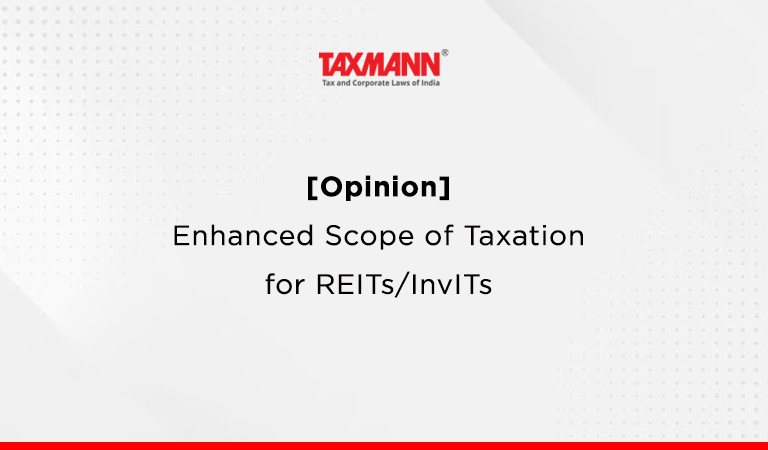[Opinion] Enhanced Scope of Taxation for REITs/InvITs
- News|Blog|Income Tax|
- 2 Min Read
- By Taxmann
- |
- Last Updated on 16 March, 2023
 Vishal Hakani & Neha Mehta – [2023] 148 taxmann.com 228 (Article)
Vishal Hakani & Neha Mehta – [2023] 148 taxmann.com 228 (Article)
Real Estate Infrastructure Trusts (‘REITs) and Infrastructure Investment Trusts (‘InvITs’) have gained popularity in recent times among investors as they offer the opportunity to invest in alternate asset classes. Also, the Income Tax Act, 1961 (‘Act’ or ‘ITA’) provides for special tax regime for REITs and InvITs (hereinafter referred to as ‘Business Trust’ collectively). The special regime was introduced in order to address the challenges of financing and investment in infrastructure and the real estate sector.
The Business Trust usually invests in special purpose vehicles (‘SPV’) through a combination of equity and debt. The provisions of ITA provide a pass-through status to a Business Trust in respect of following income received by it:
– Interest income
– Dividend income
– Rental income
The aforesaid income is taxable in the hands of unitholders whereas any other distribution received by the unitholder from a Business Trust is not taxable in the hands of such unitholders but would be taxed at the Business Trust level.
The distributions received by the Business Trust also have an element of repayment of debt and such repayment is not taxable in the hands of the unitholder (as it is not covered under the aforesaid heads of income which are accorded pass-through status). Further, for a Business Trust the repayment of debt is capital receipt and therefore cannot be considered as income. Accordingly, the repayment of debt is not taxable in the hands of either the unitholder or the Business Trust.
The distribtion of repayment of debt proceeds by a Business Trust to its unitholders were being made without any redemption of units and thus the cost of the unitholders remained intact. This offered undue advantage to the unitholders as they could claim higher cost base on subsequent redemption/secondary transfer of units. This has been plugged by the proposed amendement to Budget 2023.
According to the proposed amendment, any sum received by the unit holder of a Business Trust which is not in nature of interest, dividend or rental income (in case of REIT) and is not chargeable to tax in the hands of Business Trust, will be taxable as income from other sources, in hands of the unit holder.
Click Here To Read The Full Article
Disclaimer: The content/information published on the website is only for general information of the user and shall not be construed as legal advice. While the Taxmann has exercised reasonable efforts to ensure the veracity of information/content published, Taxmann shall be under no liability in any manner whatsoever for incorrect information, if any.

Taxmann Publications has a dedicated in-house Research & Editorial Team. This team consists of a team of Chartered Accountants, Company Secretaries, and Lawyers. This team works under the guidance and supervision of editor-in-chief Mr Rakesh Bhargava.
The Research and Editorial Team is responsible for developing reliable and accurate content for the readers. The team follows the six-sigma approach to achieve the benchmark of zero error in its publications and research platforms. The team ensures that the following publication guidelines are thoroughly followed while developing the content:
- The statutory material is obtained only from the authorized and reliable sources
- All the latest developments in the judicial and legislative fields are covered
- Prepare the analytical write-ups on current, controversial, and important issues to help the readers to understand the concept and its implications
- Every content published by Taxmann is complete, accurate and lucid
- All evidence-based statements are supported with proper reference to Section, Circular No., Notification No. or citations
- The golden rules of grammar, style and consistency are thoroughly followed
- Font and size that’s easy to read and remain consistent across all imprint and digital publications are applied



 CA | CS | CMA
CA | CS | CMA
